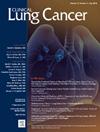The Role of Primary Care Providers in Lung Cancer Screening: A Cross-Sectional Survey
IF 3.3
3区 医学
Q2 ONCOLOGY
引用次数: 0
Abstract
Background
Multidisciplinary lung cancer screening (LCS) programs that perform shared decision-making visits (SDMV) and follow up annual low dose computed tomography (LDCT) have been emerging. We hypothesize that primary care providers (PCPs) prefer to refer patients to LCS programs instead of facilitating the screening process themselves.
Methods
This is a mixed-methods, cross-sectional study in which an online survey was administered to PCPs between April 2023 and June 2023.
Results
58 PCPs in the same hospital network participated in the study with a median age of 43 (34-51), predominance of women (77.6%), and clinicians of white and Asian race (44.8% and 48.3%). Respondents estimated that 26.1% (SD 32.4%) of their eligible patients participate in LCS screening. PCPs thought that an LCS program was equally convenient to performing screening themselves for identifying eligible patients and ordering LDCT. However, 63.8% of participants preferred an LCS program for performing SDMVs, 62.1% for ensuring annual follow-up on negative LDCTs, 70.7% for deciding next steps on positive LDCTs, and 60.4% for performing smoking cessation counseling. PCPs agreed that an LCS program saves time (69%), allows patients to receive specialty care (65.6%), addresses patient concerns (70.7%), ensures annual follow-up (77.6%), and manages abnormal findings (79.3%). However, they also expressed concerns about an additional visit for the patient (48.2%) and patient cost (46.5%).
Conclusion
Most PCPs believe that formal LCS programs have many benefits including providing specialized care and follow up, although there were concerns about patient time and cost.
初级保健提供者在肺癌筛查中的作用:一项横断面调查。
背景:多学科肺癌筛查(LCS)项目正在兴起,该项目执行共同决策访问(SDMV)和年度低剂量计算机断层扫描(LDCT)随访。我们假设,初级保健提供者(PCPs)更愿意将患者转介给肺癌筛查项目,而不是自己推动筛查过程:这是一项混合方法横断面研究,我们在 2023 年 4 月至 2023 年 6 月期间对初级保健提供者进行了在线调查:同一医院网络中的 58 名初级保健医生参与了研究,他们的中位年龄为 43 岁(34-51 岁),女性占多数(77.6%),临床医生为白人和亚裔(44.8% 和 48.3%)。受访者估计其符合条件的患者中有 26.1%(标度 32.4%)参加了 LCS 筛查。初级保健医生认为,在确定符合条件的患者和订购 LDCT 方面,LCS 计划与自己进行筛查同样方便。然而,63.8% 的参与者倾向于使用 LCS 项目进行 SDMV,62.1% 的参与者倾向于使用 LCS 项目确保每年对 LDCT 阴性患者进行随访,70.7% 的参与者倾向于使用 LCS 项目决定 LDCT 阳性患者的下一步治疗,60.4% 的参与者倾向于使用 LCS 项目进行戒烟咨询。初级保健医生一致认为,LCS 计划可以节省时间(69%)、让患者接受专科治疗(65.6%)、解决患者的疑虑(70.7%)、确保年度随访(77.6%)以及处理异常结果(79.3%)。然而,他们也对患者额外就诊(48.2%)和患者费用(46.5%)表示担忧:大多数初级保健医生认为,正规的 LCS 项目有很多好处,包括提供专业护理和随访,但他们也对患者的时间和费用表示担忧。
本文章由计算机程序翻译,如有差异,请以英文原文为准。
求助全文
约1分钟内获得全文
求助全文
来源期刊

Clinical lung cancer
医学-肿瘤学
CiteScore
7.00
自引率
2.80%
发文量
159
审稿时长
24 days
期刊介绍:
Clinical Lung Cancer is a peer-reviewed bimonthly journal that publishes original articles describing various aspects of clinical and translational research of lung cancer. Clinical Lung Cancer is devoted to articles on detection, diagnosis, prevention, and treatment of lung cancer. The main emphasis is on recent scientific developments in all areas related to lung cancer. Specific areas of interest include clinical research and mechanistic approaches; drug sensitivity and resistance; gene and antisense therapy; pathology, markers, and prognostic indicators; chemoprevention strategies; multimodality therapy; and integration of various approaches.
 求助内容:
求助内容: 应助结果提醒方式:
应助结果提醒方式:


